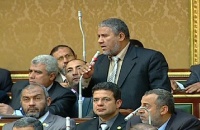Home » Egypt » Press Releases » EGY - News » Egypt: URGENT APPEAL – Former Parliamentarian Tortured and Denied Medical Care in Detention
Following the July 2013 military coup against Mohamed Morsi, the Homeland Security proceeded to numerous arrests of Muslim Brotherhood politicians. As a consequence, on 26 August 2013, some officers went to this 58-year-old's workplace at the Education Directorate of Damietta and arrested him. The former Parliamentarian, elected in 2012, was immediately brought to Damietta's second police station where he was detained for a day without charges. He was then moved to Damietta's Central Security Forces facilities, 162 km North of Cairo, where he was secretly detained in particularly harsh conditions for over a month.
Following this ordeal he was transferred to Gamasa prison on 1st October, where officers psychologically tortured him for 11 consecutive days. He was subsequently charged with "constitution of a gang of thugs" but the public prosecution dropped the charges on 15 January 2014 and requested his release, an order that was not implemented by the prison's administration.
Detained outside of the law, he was charged again with "incitement to murder", "affiliation to the Muslim Brotherhood" and "assault on a police station", all fabricated charges that were similarly dismissed by the prosecution office on 10 February 2015, although it did not allow for his release. He was eventually charged with "incitement to arson against the Islamic centre of Damietta", a case in which he should be heard by the court on 26 May 2015.
Particularly worried over his fate, as his health has kept on aggravating since his arrest, in particular because of the authorities' constant refusal to medicate him, his relatives and other inmates have warned the prison administration on numerous occasions that Al Fallahgi might have developed cirrhosis and should be hospitalised, but to no avail.
It was only in very last resort that the prison personnel authorised his urgent hospitalisation in Damietta on 9 March 2015. According to his wife, the doctors only performed an X-ray examination and, pressured by the authorities, they refused to give him the results. Still in need for medication, he was sent back to Damietta police station where he was forced him to sleep on the bare ground. Unable to sleep because of the intense pain, he asked the authorisation to be hospitalised again, a demand that was accepted over a year later, on 8 April 2015, when he was transferred in emergency to Damietta hospital. Despite both a kidney and gallbladder inflammations, the doctors were again pressured to deny him medical treatment. Al Fallahgi was brought back to Gamasa prison where he remains detained to date in bad health.
"Refusing medical care against an individual characterises a form of torture, especially when this refusal is motivated by the political stand of the individual," said Rachid Mesli, Alkarama's Legal Director. "There should not be any justifications to deny an individual his right to medical care, particularly when his health is in danger," he added. "The Egyptian authorities should guarantee this fundamental right to everyone, including political detainees."
Alkarama has already documented several cases of individuals who have been denied the most basic medical attention, including two in Gamasa prison on 29 August 2014 and 17 February 2015. In some cases, the lack of medical care even led to the prisoners' deaths in detention. In none of these cases have the authorities launched an investigation, despite the proved involvement of government officials into their deaths, demonstrating the characteristic connivance between the judiciary and the perpetrators of those crimes.
Since local remedies were unavailable in Egypt, Al Fallahgi's family turned to Alkarama to call upon the SRT and the SRH to ask the Egyptian authorities to guarantee his physical and psychological health and hospitalise him immediately. They should also investigate the reports of psychological torture that have been made and, shall they be confirmed, prosecute their authors. Egypt should live up to the recent commitments it has taken during its last Universal Periodic Review (UPR) – for more details, see UPR Second Cycle documents – and guarantee that all sorts of torture and ill-treatment practices are abolished, investigated and prosecuted, even in health-care settings.
For more information or an interview, please contact the media team at This email address is being protected from spambots. You need JavaScript enabled to view it. (Dir: 41 22 734 1007 Ext: 810)
 Algeria
Algeria Bahrain
Bahrain Djibouti
Djibouti Egypt
Egypt Iraq
Iraq Palestine/Israel
Palestine/Israel Jordan
Jordan Kuwait
Kuwait Lebanon
Lebanon Libya
Libya Mauritania
Mauritania Morocco
Morocco Oman
Oman Qatar
Qatar Saudi Arabia
Saudi Arabia Sudan
Sudan Syria
Syria Tunisia
Tunisia United Arab Emirates
United Arab Emirates Yemen
Yemen Other Countries
Other Countries







